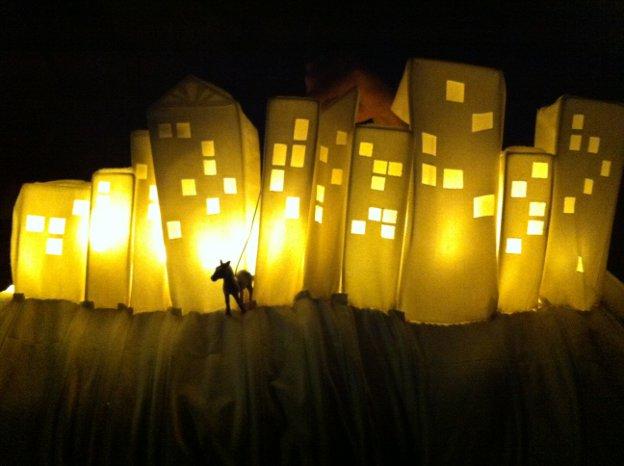I’m sitting in the Battersea Arts Centre in a dark room; through headphones Marco Polo quietly whispers his description of a fantastical city. Fans blow the soft scent of jasmine across the room. ‘Relax into your seat,’ a voice tells me. ‘You are the Kublai Khan.’ We sit for awhile, me and Polo, in my sumptuous palace garden in Xanadu, while he shares his poetical depictions of the many wondrous cities that lay across the vast reaches of my empire.
Still Night is based on the novel Invisible Cities by Italo Calvino, in which the Kublai Khan is given fantastical descriptions of the cities in his empire by Marco Polo. London-based Berlin Nevada have extended this vision to London and have presented Still Night as a lecture about the city, aiming to place it under a theatrical and fantastical lens. There is a lot that works very well, but there is also much that does not.
We are welcomed by Silvia Mercuriali, who gives us an overview of London, all in a nonsense language with only the odd English word. This nonsensical device provides much humour and allows us to warm to our storyteller. It also prompts us to find our own interpretation of what she is saying, our own imagining of the city. This is a theme taken directly from the novel as Polo and the Kahn speak different languages and derive their own interpretations from each other.
After Mercuriali has covered the obvious landmarks she begins to search for the hidden side of the city. She catches the city’s reflection in the water and wonders how she can get to the ‘London below’. This is where the show began to get really interesting as my mind went reeling as to what she would discover in this mysterious mirror world. But unfortunately it is also where the show loses itself. From that point we are asked to wear the headphones and are told the stories of Polo’s adventures.
The technique is utterly beguiling and works very well in and of itself. However it does nothing to further the aim of the piece, which is to explore London. Instead we move into more of a theatrical presentation of the source material, which, however lovely it is, derails the piece entirely.
From there it sort of meanders off, as the novel imposes itself more and more on the production the whole aim of the piece is lost. Then when co-performer Gemma Brockis dons a huge horse head and pretends to be Polo’s horse I couldn’t help but wonder if they had forgotten why they started.
The ending could have saved the whole thing. As they began to take down the shutters from the windows and the street light spilled in I expected to be given a view of the city outside that would put all that precedes into context – but sadly only a couple of windows at the far side of the stage were revealed, through which we had no vantage to see the city that should have been the star of the show. The piece then suddenly ended as we were told that a technical failure meant that they couldn’t show us a final video epilogue.
With technical difficulties aside the play currently does not get anywhere near to achieving the aims it sets out for itself, but it so easily could do. The source material is rich, the performers are very strong, and with a little tweaking the techniques could be used to a much more satisfying purpose. I hope they keep working on it; if executed effectively this could be a great piece of theatre, even if it’s just not quite there yet.


